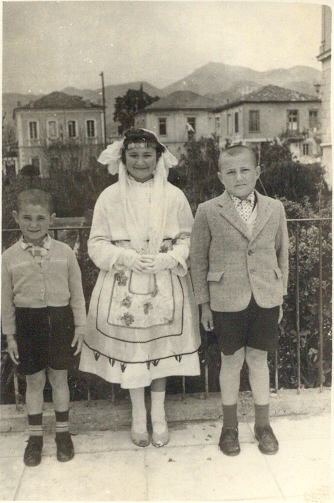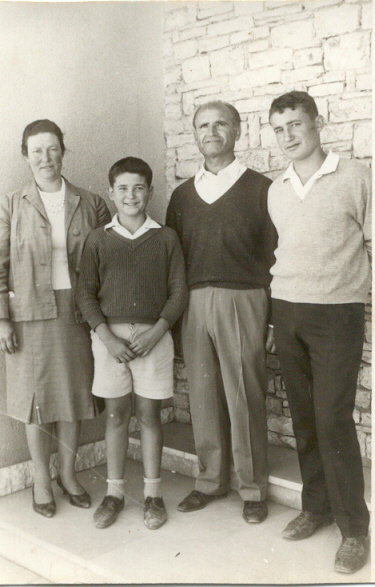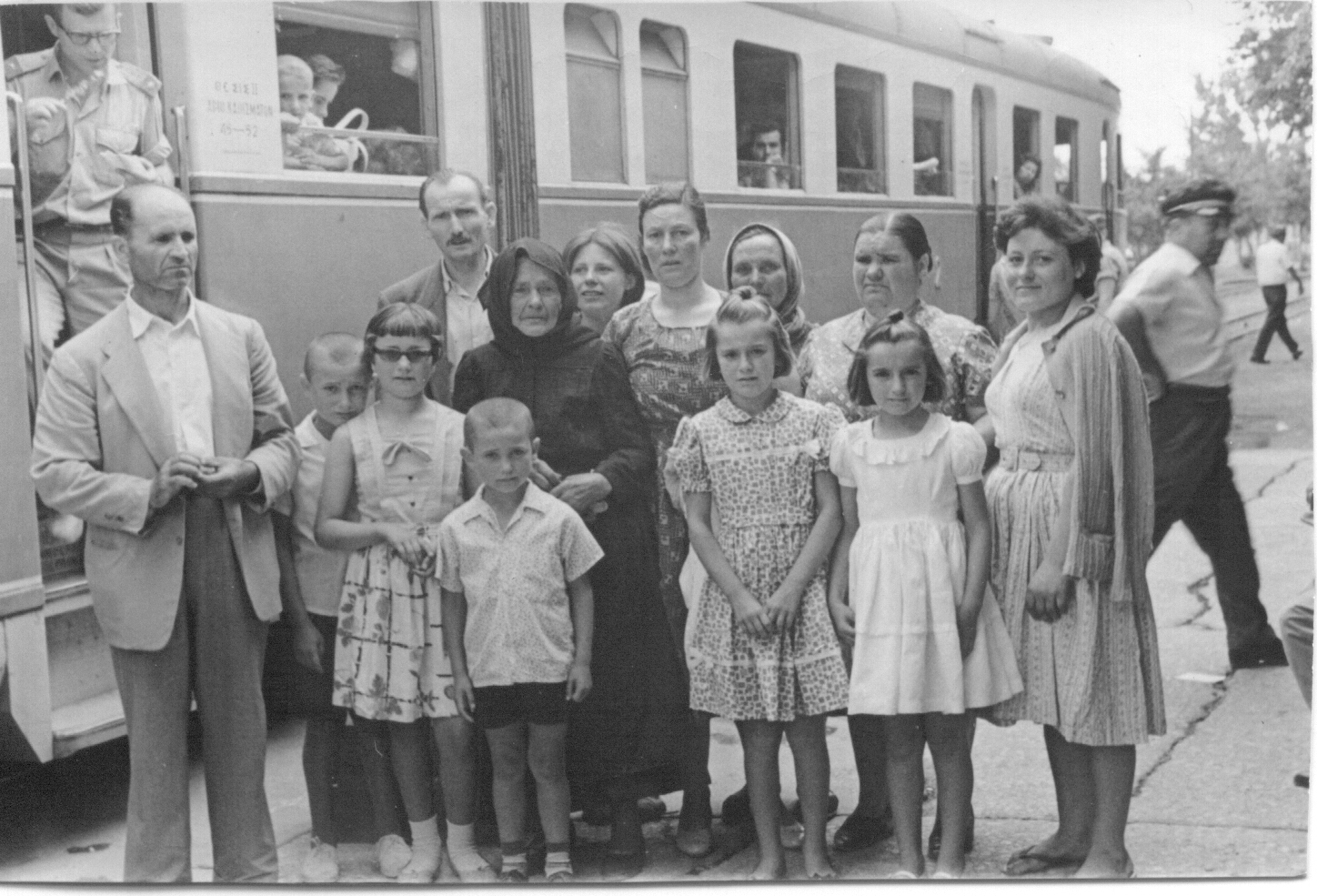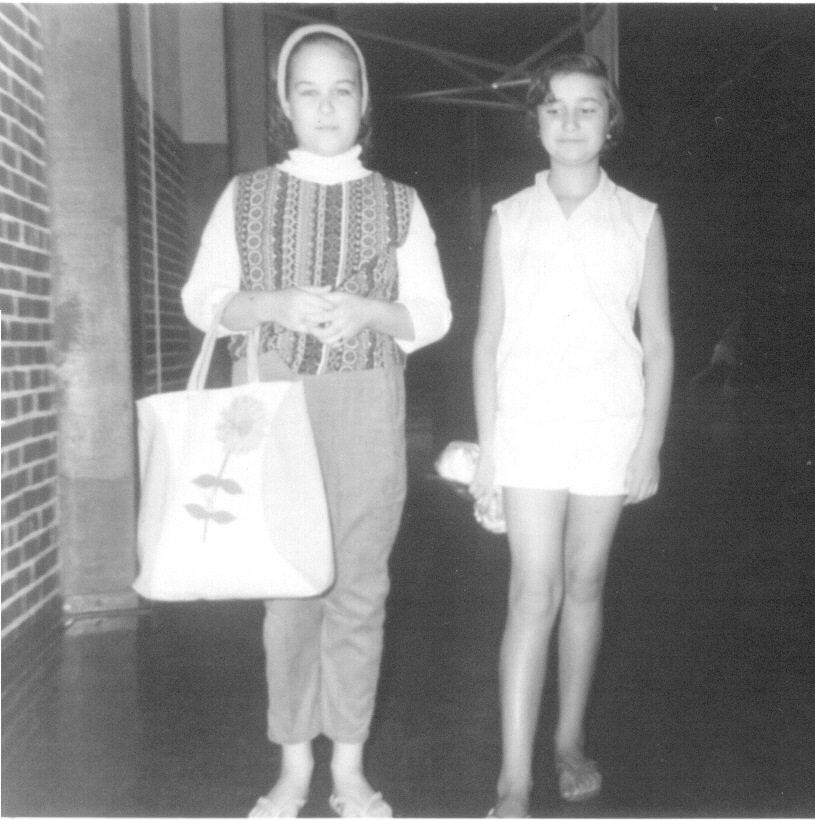Annette Constandine
(nee Athanasia Dekazos)


Well, when I was there, I was a young child, so usually my parents left VERY early in the morning, before even the sun rose, and went to work out at the farm. They worked hard all day and we children went to school. We were looked after by my grandmother until times when my parents could come home. Then we would all go together and maybe work on the farm, and we children would help them...for example we could [plant] potatoes...we could pick tomatoes or we could pick the grapes...Life was hard; we had no electricity and no indoor plumbing...We went to school, but...the instructors were very strict. I remember we had a huge emphasis on geography...Many a day when students would not know their lessons...the professor would take out his ruler...you had to put out your hands, palms up so that he could hit your palms, and boy they burned and you would sit on your poor hands until they were numb...That was basically life as I remember it. Of course as a child we didn't have as many responsibilities but I remember my parents worked VERY hard...
How did it come about that you were to come to America, and what did you think when you found out you were being sent to a completely foreign country?
I was one of three children, and being a daughter, I guess it was sort of a burden for my family who didn't have much...to raise a daughter...get a dowry together...see to it that she married...my parents knew that would be tough. But...we had relatives in California and Atlanta, Georgia. [The relatives from Atlanta], an aunt and uncle and their little boy at the time came to visit, and I guess the adults talked and I suppose they saw how hard it was for all of us, and somehow it came up that this aunt from America would like to have a little girl...They decided that perhaps I would be adopted and become the child of my aunt and uncle and that way I would come to the United States and grow up, have a good life and have a chance to be something...It would sort of unburden my parents...Boy that sounded super fantastic to me because America was the "Land of Opportunity." You could do anything there, everything would be so easy (this was what we all thought) and everything would be wonderful, so I was excited. But of course as the time approached I kind of got nervous...but I couldn't really say too much that I was nervous...the decision was made and the expectation was of something great to come.

What did other people in Greece think when they found out you were coming to America? Did they treat you differently?
The way I experienced it, I felt like they were jealous...that I was going to come [to America] and have a great life. I'm sure the adults when they talked amongst themselves, might have said "How could they do that, send their daughter away?" But...my friends, you know the young kids, were jealous and of course I thought I was really something, I was special that I was going to come here. I remember thinking I was going to come up here and actually have a dishwasher! It was like, unheard of there.
What did you think America would be like based on what you had heard from others?
Oh, I thought it would be, literally, almost like streets paved in gold and money growing on trees. I just thought that they had everything over here and life was great and very very easy. I thought that there would be no problems, at all.
How did you get to America?
First I left the village on a bus, then we went to the city of Tripoli, which was the closest town nearby. I boarded a train, I think it was an overnight train, we took the train to Athens, and from there...I got on a plane, and I was in awe. I flew from Athens, Greece...I think we made one stopover in Frankfurt, Germany, and flew into New York, where my aunt and uncle met me at the airport.

What did you bring with you on your trip here?
Well, (laughs) the clothes on my back. I got a brand new dress, a brand new pair of shoes (of course, to me they were new, I think they were probably hand me downs). I had my spiffy new sunglasses, I never had sunglasses before. So just basically what I had on me, and plus I brought a couple little souvenirs from Greece...like the Parthenon, and some other little statue, Athena I think.
Did everything go smoothly when you went to New York or were there any complications?
Things went smoothly when I came, but there had been some complications before that. When I was going to come here there was a quota at the time, and I guess the quota had been met for how many Greeks could come. I was told, and my family was told, and my aunt and uncle were told that I couldn't come, the quota had been filled. However, my aunt and uncle have told me that...because I wasn't just a "regular" immigrant, I was being adopted, I guess that was slightly different. So they contacted a senator in Atlanta...who kind of got the ball rolling, and my aunt and uncle had to physically go to Washington D.C. where a bill was introduced and they went for a hearing. Supposedly this bill was signed by President Kennedy, and as she tells it to me, she believes it was specifically just for me, because I was being adopted. So President Kennedy signed this bill, which paved the way for me to come here.
What was your first impression of America?
I was just in awe of everything. When we landed in New York at the JFK Airport, I had never in my life seen an escalator. So I was just going up and down the escalators (laughs), up and down the escalators, because it was really something for me to experience. And of course I had never seen a TV, so at the hotel...I just sat in front of the TV with my mouth open; I couldn't believe it. And also, a shower! (Laughs) I had never seen a shower. So when I got in the shower, I think I was in there like, 2 hours. Yeah, I was in awe, and I thought everything was just wonderful.
Did you know of any others who came to America from Greece around the same time you did, and what their experience was like?
Yes, there were several people that had gone to the United States. I knew people who went to the US, people who went to Australia (a lot of people went to Australia at the time), and some to Canada. But they all raved about it, word would come back to the relatives that it was all wonderful. Now I think that surely they had problems but we certainly didn't hear about that.
What was your biggest surprise in America?
The biggest thing was that there were SO many types of people here. In the small village, everyone was the same, farmers, definitely just white people. However, when I landed in New York, for the first time I saw black people. And I believe I saw some Indian people. That was a huge surprise to me. I didn't understand how their skin could be black. Later on, once we got to Atlanta, [I found that] my aunt had a black maid. I couldn't help wondering...when she made some sandwiches for me, if the black of her skin would come on to the bread. (Laughs) That's how ignorant I was...So probably that was the biggest surprise.
How long did it take you to learn English?
I came in June, and...[we] agreed that it was best for me to try and fit in as soon as possible. At the time, school began after Labor Day. So I had just a couple of months to learn English. I mean I knew NO Englsih when I came over here. I knew "Yes" and "No", and that was basically it. So that summer I went to summer school. I remember my aunt drove all across town to take me to summer school, and of course all the kids there were American kids, so I heard only English all around me. At home they wouldn't speak to me in Greek. It was English; English, English everywhere, so I had to learn it quickly and I did. And I guess as a young child you pick it up pretty quickly.
Did the schoolchildren treat you any differently, or were they accepting?
I think they were very accepting. They were very nice to me.

Did you like America? If not, how long did it take before you liked living here?
Yes, I liked it. There were a lot of things I had to get used to. (Laughs) Food, for one thing...Sometimes I was homesick. There were times when I kind of wished I could go back, when things got tough. But generally I liked it, and I was happy.
What type of situations would have made you want to go back?
Oh, I remember times when I was a teenager, and you know, any teenager sometimes has a hard time with parents, so my "new" parents...by this time I called them Mom and Dad...whenever we would have our, let's say, fights, I really wanted to go back, but that's about it.
What was the first significant historical event you remember, and what did you think about it as a young immigrant?
I remember very clearly when President Kennedy was shot and killed. I was VERY moved and very saddened, because, I don't know, I felt a real closeness to President Kennedy....everyone in Greece, I know, loved President Kennedy, so it really really touched me and really saddened me.
What was your first major purchase in America?
Well I remember my aunt wanted to take me shopping to buy some clothes and shoes, and various things, and I could not understand the need to buy more than one of something. She wanted to buy me several dresses, and several pairs of shoes, and underclothes, and I remember I kept saying (laughs) "But I HAVE a dress! But I HAVE a pair of shoes!" This is something that we sometimes laugh about together now...
How much of your Greek culture/customs would you say you have retained?
At first, I didn't want to keep my culture and customs...As a young teenager, and young woman, I was interested in just "fitting in" and being just the same as everyone else...but as I grew older, I began to see those things as important and so I found someone that was Greek to begin talking to in Greek, and I began reading the Orthodox Observer [a newspaper], and began going to the Greek church, so yes...when I got older I considered those things important.
Did you ever go back to Greece once you had become "Americanized" and how did everything seem to you?
I didn't go back for several years because my new parents felt that, emotionally, I should be more mature before I went back to handle the situation...I did go back when I was 21, and I visited for the summer. It's as if although it was nice to see them, and I had missed them, I appreciated what a good life I had back in the US. Things were still tough, but GREATLY improved by the time I went back...I saw all my friends and cousins, and [they], particularly the women worked VERY hard. They had gotten married and worked hard out in the fields or tended the sheep, and I remember thinking "Gosh, I have it good."
Did you do anything to give back to the community you grew up in?
Yes...every year we would send lots of clothes for the children, and I remember we sent a lot of [American] cheese back to the elementary school...(laughs) the same elementary school with that same teacher (he was still there) that used to burn my hands. It was something that they really needed over there, and appreciated...and I think we sent some money too, and toys for the kids, so I felt like we were contributing to the community back there.
What is your village like today?
It's amazing, it's not just a village, it's...a resort! People go live out there to get away from the city. Of course now they have everything, they have electricity, plumbing, TV's, computers...so COMPLETELY different from when I was there.
Is there anything you would like to add?
I think that I had a pretty easy time adjusting because I was young, and children are generally more accepting, but I know adults who had to go through the same things had a much more difficult time assimilating.
Travel in Tripoli, Greece-Culture. World Travel Gate. http://www.eurotravelling.net/greece/tripoli/tripoli_culture.htm (2000). This site gives useful information on Traveling to Greece, and also provides history and cultural information about the different regions and cities in Greece.
Emory Nursing School. Nell Hodgson Woodruff School of Nursing, Emory University. http://www.nursing.emory.edu/nursing/index.cfm (2005). This site tells about the Woodruff School of Nursing that my mom attended. It gives historical information, as well as information on the University and current programs.
Greek Orthodox Cathedral of the Anunciation. Cathedral Resources. http://www.atlgoc.org/cathedralresourcesmenu.htm (1997). This website gives all kinds of information about the church where my parents were married, as well as information about the Greek Orthodox faith, and other miscellaneous Greek-related links.
John F. Kennedy Airport. About the Airport: Facts and History.
http://www.
panynj.gov/aviation/jhisfram.htm (2001).
This is the official website of the John F. Kennedy International Airport where my mom first
landed in America.
Immigration Museum: Immigration to Victoria, Australia. Discovery & Research: Timelines. http://immigration.museum.vic.gov.au/timeline/time1970.asp (2003). This is the official website of the Immigration Museum in Victoria, Australia, and gives an extensive history of immigration to and settlement in Australia, and also general information about museum exhibitions, etc.
McAdams, John. The Kennedy Assassination. The Kennedy Assassination Home Page. http://mcadams.posc.mu.edu/home.htm (1995). This website provides information about the different theories behind JFK's assassination and links to numerous articles written on this topic.
Greek Orthodox Archdiocese of America. News and Events: The Orthodox Observer. http://www.goarch.org/en/news/observer/ (2003). This is the website for the Greek Orthodox Archdiocese of America, and gives news on what is happening in the Church. This organization publishes the Greek Orthodox Observer, a newsletter sent to members of the Greek Orthodox faith all over the country.